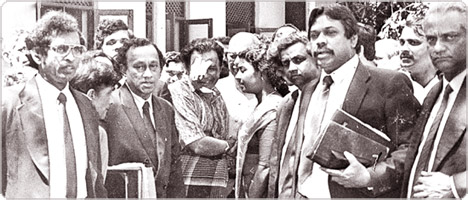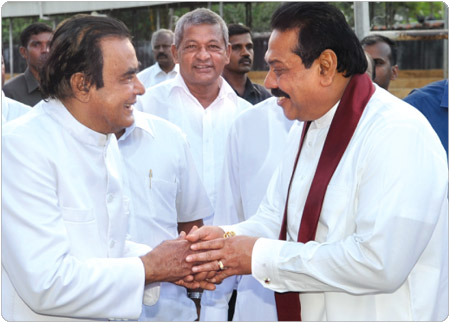President Rajapaksa:
A champion of Human Rights
Prime Minister D.M.Jayaratne sharing his past experiences and
memories about President Mahinda Rajapaksa with Daily News Staffer
Rasika Somarathna
|

D.M. Jayaratne, now Prime Minister at the Embilipitiya
Magistrate's Court having sustained injuries at Suriyawewa
during the 1994 Southern Provincial Council election. President
Mahinda Rajapaksa appeared for him in court.
|
President Mahinda Rajapaksa was first elected
to the Parliament in 1970 as a member of the United Front Government led
by Prime Minister Sirimavo Bandaranaike. He was the youngest MP to enter
the Sri Lankan Parliament at the age of 24
He succeeded his father- veteran politician DA Rajapaksa, coming from
a family with a long-standing tradition of serving the people setting
aside, race or religion, caste or creed.
First speech in Parliament
He was also a law student at the time. I still remember his first
speech in the inaugural parliamentary session in 1970. His eloquent
speech garnered praise from both sides of the house alike. His first
speech delivered with the exuberance of youth and sharp oratorical
skills kept the house spellbound. With his maiden speech itself he
etched a name for himself in a parliament which consisted some legendary
politicians of our time.
At a very young age he showed standout qualities coupled with
political acumen beyond his age. From the beginning itself he showed
signs that he would not only become a successful politician but also a
strong political leader.
First major challenge
With the defeat of the then United Front government in 1977, the
young Mahinda Rajapaksa faced his first major political challenge. It
was not only a challenge for himself but was one of the most challenging
times for the party as a whole. It was the period, the victorious UNP in
1977 unleashed a wave of violence on the opposition as never seen
before. This political vendetta launched by the UNP on its opponents
left a trail of destruction in its wake. The SLFP which bore the brunt
of these violent acts was in disarray.
|

Prime Minister D.M. Jayaratne with President Mahinda Rajapaksa. |
It was in this backdrop that the up and coming young politician
Mahinda Rajapaksa rose to defend the victimized SLFP members who were at
the receiving end. He rose fearlessly even as the UNP unleashed its full
might on the hapless party supporters.
He mobilsed people against the injustices of the then, government,
defended their rights in courts and took their grievances and unjust
political victimization to international forums.
It was this fearless trait which he showed from an early age in
defending the down trodden which earned him devoted friends and
supporters alike, who stood by him steadfastly both in good and bad
times. The party cadre from the grassroots followed him with devotion
and looked up to him as their leader and protector. The young Mahinda
never let them down.
He always was a defender of labour rights and human rights. He was a
leading member of the Parliamentarians for Human Rights, and in the days
of grave human rights violations under the UNP government in 1988/89
took the lead in agitating in defence of human rights, taking the issue
before the international community.
He was also a law student at the time. I still remember his first
speech in the inaugural parliamentary session in 1970. His eloquent
speech garnered praise from both sides of the House alike. His first
speech delivered with the exuberance of youth and sharp oratorical
skills kept the House spellbound. With his maiden speech itself he
etched a name for himself in a Parliament which consisted some legendary
politicians of our time. At a very young age, he showed standout
qualities coupled with political acumen beyond his age. From the
beginning itself he showed signs that he would not only become a
successful politician but also a strong political leader. In the
aftermath of the 1977 UNP victory too he stood for the rights of the
victimized fearlessly.
He did not stop there but made his concerns known loud and clear in
the global scene on rights issues of other countries. He was the
President of the Sri Lankan Committee for Solidarity with Palestine for
a long time. He always voiced concern on the issues faced by Palestine
people. He raised his voice in many international forums to make the
global community aware of the importance in finding a peaceful solution
to the Middle East problem within the framework of a sovereign
Palestinian state.
As a lawyer he represented me when I was wrongfully charged with
shooting another person during elections period in 1994 at embilipitiya,
Sooriyawewa. He stood for me fearlessly at the time despite numerous
intimidation by the then UNP rulers.
Paada Yathra
He mobilized people and launched a number of innovative campaigns in
protection of the democratic rights of the people that were being
gravely endangered during the UNP rule. Among the campaigns he led was
the hugely successful “Paada Yaathra” - a pilgrimage of protest on foot
from Colombo to the southern shrine of Kataragama, which saw massive
participation by the people. He also took the lead in organizing several
other public protest campaigns which laid the groundwork for the defeat
of the UNP government in the General Election in August 1994.
Paada Yatra campaigns from Colombo to Kataragama and from Colombo to
Ratnapura led by Mahinda Rajapaksa were the key turning points in
bringing down the then UNP mis-rule.
The first Election Rally in the campaign for Presidential stakes
I clearly remember that the inaugural Presidential campaign meeting
in 2005 of President Rajapaksa was held in my electorate at Gampola
town.
We had our lunch at ‘Ambuluwawe’ and later went to the ‘Polwatte
Pirivena’ to open a ‘Nenesala’ before coming to the meeting. That day
Gampola town became a sea of heads. That is how he began the successful
campaign which propelled him to Presidency.
Country first
One of his foremost characteristics I saw from an early age was his
undying love for his motherland. During his political career of which I
saw him becoming a MP, a Minister, the Opposition Leader, the Prime
Minister and then the President he was a politician who never hesitated
to take decisions which he thought would benefit his motherland and its
people.
He also was a leader who did not take decisions with personal
benefits in mind. This characteristic stood well for him and the
motherland in the battle against terrorism. As he emphasised, many
times, his first, second and third priority at all times was Sri Lanka.
I would always like to identify the President as a people’s
representative and a guardian because he truly cared for their
well-being and never hesitated to help them in their need. As he did
during happy tidings, he never neglected them during difficulty.
He was so close to the people, he knew their heart beat, their
sorrows, fears and needs.
One can never forget the scenes witnessed in the immediate aftermath
of the Kebithigollewa bomb blast where an emotional President flew to
share his grief with the bereaved families despite security concerns.
I believe that this genuinely honest trait in him helped to achieve
dizzy heights in politics.
When the President ordered our Armed Forces to launch a humanitarian
operation as Commander in Chief of the Armed Forces, he had clear goals
such as to liberate people under the clutches of LTTE, re-establish
democracy in the North and East, wipe out the scourge of terrorism and
achieve honourable peace.
However the challenges he had to face in this endeavour was enormous.
I truly believe that any other leader would have succumbed to pressures
which originated from both within and outside. But he stood firm with
unwavering commitment in the face of all odds.
As a result the Armed Forces, politicians, and the general public
rallied round him to forge ahead a future of freedom, progress and
harmony. He achieved something which four other President’s before him
could not achieve.
Under his leadership Sri Lanka has re-emerged from a state of despair
to one of determination and hope. However, Sri Lanka yet face a number
of challenges in its quest to achieve permanent peace and prosperity..
But unlike in the past the country now is in the correct path and is
making rapid progress under the guidance of the President. It was
declared recently that Sri Lanka possessed large gas deposits off shore.
It is a clue that fuel is not too far behind.
When he mentioned for the first time that he would transform Sri
Lanka to be the miracle of Asia, most people did not take it seriously.
But today Sri Lanka is on the path to achieve this cherished goal. We
have embarked on developing agenda as never seen before. The country is
brimming with confidence, investment is flowing in and the the nation
has gone on to be recognised as a middle income earning country.
The Magampura harbour would soon become a naval hub in the region.
The numerous power plants recently built would soon achieve the goal of
100 per cent eletrification of the country.
Today we have come a long way from the dark days of the past, under
President Mahinda Rajapaksa’s leadership. We also have a lot more to
achieve in the future. However unlike in the past now we look to the
future with confidence, hope and vigour under his guidance to propel the
country towards greater heights. |